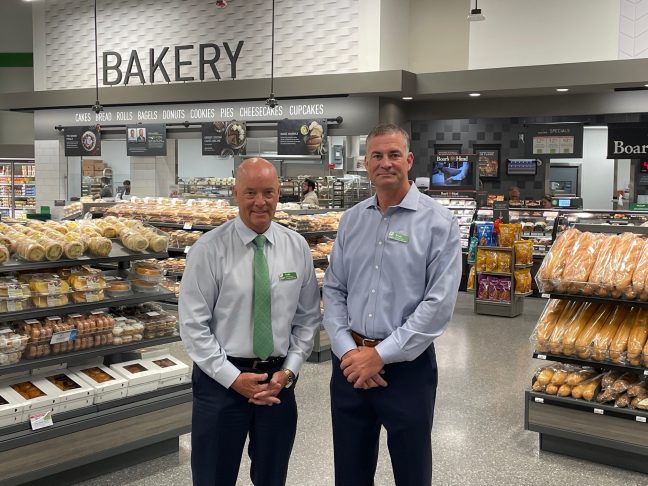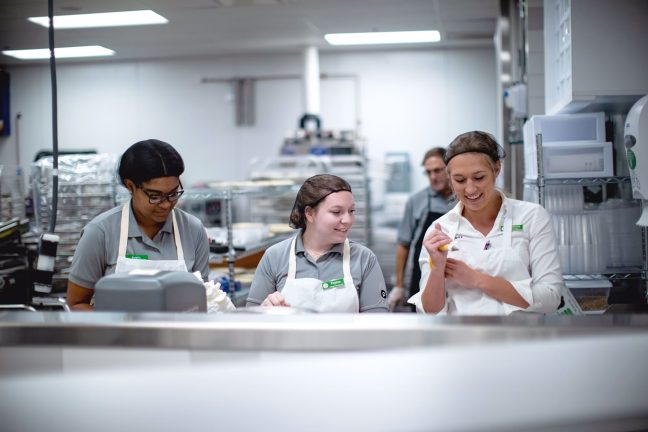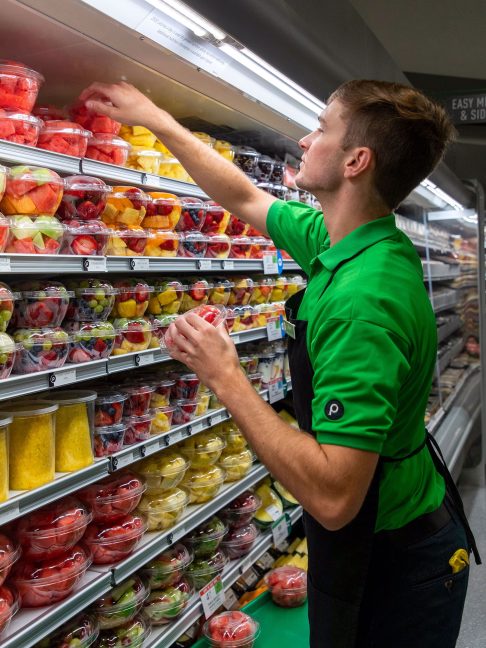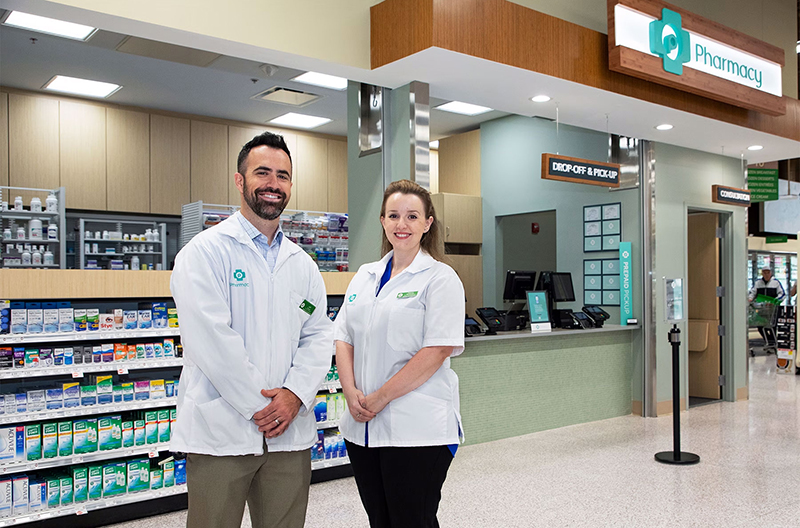Publix was founded in 1930 in Winter Haven, Florida, by George W. Jenkins (Mr. George) on the concept of community first. Executive Chairman Todd Jones said while food is the “backbone” of the company, “we wanted to make sure that we’ll take care of our customers and our communities.”
Talking with Shelby Publishing President and COO Stephanie Reid and SVP Jan Meade about Publix being named the publication’s first Growth Leader, Jones said he was humbled to represent the associates.

“They’re the ones that do the work every single day. They’re out here, getting up every morning, serving their community, unloading trucks, moving inventory across the network,” he said. “I’m just very thankful of what they do. Caring for Mr. Gorge’s visions from 93 years ago, being that company that knows the most and cares the most about the products we sell to people. It’s a privilege to be part of it.”
As an employee-owned company, taking care of customers and communities starts with the more than 250,000 Publix associates. Jones likes to say the company puts “the A’s [associates] before the C’s [customers] and puts the C’s before the P’s [processes]. That’s our way of saying put the associates actually in front of the customer.”
According to Jones, if they can get the hearts and minds of associates – engage them, train and develop them – they will make it right for the customer and then they can figure out the process.
“We try to say our brand is the company that knows the most and cares the most about the products we sell and the people we serve. And we live by that Publix brand every day,” he said.
“Then we figure out the logistics and supply chain, conditioning the store, stacking produce and making sure the lights are right … But you can’t get that to happen on a regular basis in more than 1,360 stores across seven states unless you’ve won the hearts and minds of the associates first.”
Publix associates have “got to be in the game.”
“If we made a company that had ownership, if we made a company of inclusive behavior where people bring their full selves to work, if we build a company of opportunity where I can start off as a bagger and I can be CEO of a company, and then in turn, that group of people wants to serve our communities and treat our customers like royalty – that’s possible,” Jones said. “It’s not possible any other way, I can assure you.
“That’s not easy to do … It takes a lot of work, a lot of planning, a lot of engaged decisions to make that happen. If you win their hearts and minds, you’ve got their hands and feet.”
Jones said if you start with hands and feet, that’s a command-and-control approach. Publix wants its associates’ hearts and minds.
“That’s a functional team and is actually harder,” he said.
Operating in the “top right quadrant” of the nine-box grid by having associates’ hearts and minds and having processes at the highest level, “you’re going to usually end up on the top, most of the time,” Jones said.
Culture of excellence
Publix has received many awards for being a great place to shop and work, including being named for 26 consecutive years as one of Fortune’s 100 Best Companies to Work For.
Jones said they make a concerted effort to find out what customers think about how well Publix is serving them. They also want to know if their associates believe they are “caring for Mr. George’s philosophy of being inclusive, continuing to provide opportunity – whether it’s recognized for customer service, great place to work for Millennials, great place for women – we want to make sure that we listen to that.”
Jones said it often is like a cause-and-effect relationship. “If I study, I should get better grades. If I have a great place to work, it’s generally going to turn into a great place to shop.”

Publix wants its associates, who also are company owners, to feel it is inclusive and that they can bring their whole selves to work. If the associates feel that way, customers also will pick up on that feeling. When he is in a store, Jones said he often will observe how associates interact with customers.
“We’ve got to be out there and be engaged,” he said.
Maria Brous, director of communications at Publix, said when people leave companies, it’s often a case of them leaving the people they work for. She said Jones and President Kevin Murphy set a pace and make their expectations known.
“It’s the ownership that we have in this company; we really are in this together. We either are going to succeed together, or we’re going to fail together. And we’re going to learn,” Brous explained.
“We don’t always get it 100 percent right, but we’re always striving to get it 100 percent right. And we’re going to make those adjustments along the way. But when you own it, you take better care of it.”
She said when Jones and Murphy are in the Lakeland office, they eat in the cafeteria nearly every day.
“There’s not many Fortune 100 companies that you can go to where you have direct access, where we have the ability to reach out to talk … They’re in the stores every week, multiple times a week.”
Jones said when they are in the store, they are there to help and to “try to find what they’re doing right.” He said they want to see the associates, say hello and meet them. He said if there is a problem, they fix it and move forward.
“We’re not perfect, far from it in some cases, but we’re going to go after perfection. That’s going to happen every day,” he said. “We’re not striving for mediocrity.”
Giving back
The Publix belief in putting community first is evident in the many ways the company and its associates give back to local communities and to causes that cross county and state lines.
During its annual stockholders meeting, Publix honored six employees with the Mr. George Community Service Award for outstanding commitment to their communities. Each year, one employee from each retail division and one support associate are recognized with the award. These associates are involved in their communities, display their personal integrity and represent the generous spirit of Publix’s founder.

Publix associates also volunteer annually with nonprofits during its Service Weeks in March and September. In 2023, more than 7,500 Publix employees across the company’s seven-state operating area volunteered at more than 200 organizations, including those working to alleviate hunger and others focused on environmental sustainability.
In September, a number of the 22 mobile food pantries Publix Super Markets Charities (PSMC) funded in 2022 were on the road, bringing Publix-provided produce and other nutritious food to communities facing food insecurity throughout the Southeast. The Feeding America partner food banks received $175,000 each from PSMC to purchase and equip their mobile units.
To further its commitment to alleviating hunger, PSMC has donated $6 million to 36 Feeding America partner food banks and more than 300 other nonprofit organizations this year. These funds will help support organizations providing services like weekend backpack programs, food pantries and meal delivery programs
In addition to volunteer opportunities, Publix continues to look for ways to reduce waste and protect natural resources. The company’s most recent efforts focus on long-term collaborations to support freshwater restoration in Florida, as well as sustainable fisheries practices.
In June, the company’s support of the March of Dimes topped $100 million since 1995 to help improve the health of mothers and children. In 2023, the Publix campaign raised about $6.4 million, making it the March of Dimes’ No. 1 corporate partner for the eighth consecutive year.
In August, Publix Super Market Charities donated $1 million to support relief efforts in areas affected by Hurricane Idalia. Publix also activated a company-wide donation campaign, allowing customers and employees to help provide relief for those affected by the hurricane.
In December, PSMC donated $10 million to build hope and strengthen communities. The donation will support more than 250 nonprofit organizations focused on providing housing and shelter services, including 125 Habitat for Humanity affiliates.
Since 2015, PSMC has donated more than $43 million to nonprofits that build homes and provide emergency shelter and transitional housing.
Read more independent store news from The Shelby Report.

